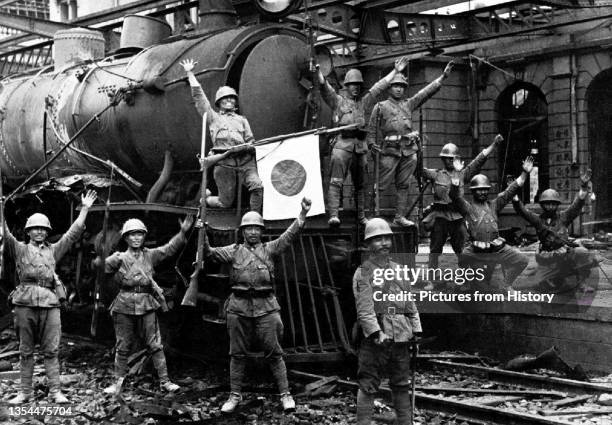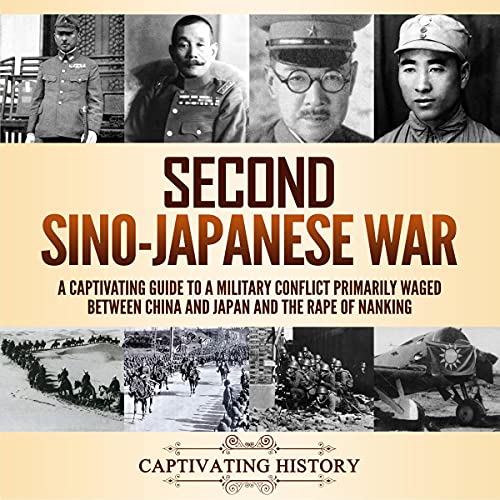The Second Sino-Japanese War was an armed conflict between Japan and China that began with the Japanese invasion of Manchuria.
Historical Background Of The Sino-japanese Conflict
The Sino-Japanese conflict refers to the series of wars and tensions between China and Japan throughout history. The first major conflict between the two nations was the First Sino-Japanese War, which occurred from 1894 to 1895. This war resulted in Japan’s victory and had a significant impact on both countries.
The Second Sino-Japanese War, also known as the China-Japan War, was a major armed conflict that started in 1937 and lasted until the end of World War II in 1945. The invasion of Manchuria by Japan in 1931 was one of the key factors leading to this war. The Second Sino-Japanese War had a devastating impact on China, with millions of lives lost and widespread destruction.
The conflict between China and Japan was fueled by various factors, including territorial disputes, historical tensions, economic rivalries, and conflicting ideologies. Japan’s aggression in China, especially during the Second Sino-Japanese War, further escalated the tensions between the two nations.
Overall, the Sino-Japanese conflict has had a profound and complex history, characterized by wars, invasions, and strained relations. It has left lasting impacts on both China and Japan, shaping their political, social, and economic landscapes.

Credit: www.gettyimages.co.uk
Japanese Aggression And Invasion
1. The Japanese invasion of Manchuria was a crucial event that marked the beginning of Japan’s aggression towards China. Taking place in 1931, the invasion was a prelude to further expansions into China, Vietnam, and Mainland China. This act of aggression led to the establishment of the puppet state of Manchukuo, which was controlled by the Japanese.
2. The significance of the Marco Polo Bridge Incident cannot be overlooked. This incident, which occurred in 1937, marked the start of the full-scale invasion of China by Japan. It resulted in widespread conflict and is considered the official start of the Second Sino-Japanese War.
3. The war between China and Japan was a brutal and prolonged conflict, with numerous battles and engagements. The Second Sino-Japanese War lasted from 1937 to 1945 and had a significant impact on both countries, resulting in millions of casualties and immense destruction.
4. It is important to note that the War with Japan and China did not have a clear-cut winner. While Japan was eventually defeated in 1945, it was a long and arduous struggle for China, with both sides suffering immense losses.
5. The war between China and Japan remains a significant chapter in history, highlighting the aggression and brutality of Japan during that time. It also had lasting political and social implications for both countries and shaped their relations in the years that followed.
Key Military Engagements And Campaigns
War With Japan And China resulted in several key military engagements and campaigns. One significant battle was the Battle of Shanghai, which took place in 1937 and marked the beginning of the Second Sino-Japanese War. It was a major conflict that lasted for three months and resulted in heavy casualties on both sides.
Another tragic event during the war was the Nanjing Massacre and the Rape of Nanjing. Following the fall of Nanjing, the Imperial Japanese Army carried out widespread atrocities, including mass killings, rape, and looting.
The Battle of Wuhan was another crucial engagement in the war. It lasted for three months and resulted in heavy losses for both sides. The strategic city of Wuhan was fiercely contested, and it played a significant role in determining the outcome of the war.
The Battle of Changsha was also a notable battle in the later phases of the war. It was a series of engagements that took place between 1939 and 1941. The Chinese forces successfully defended the city of Changsha from Japanese attacks, and it became a symbol of resistance against the invasion.
Throughout the war, there were several other salient battles that had a significant impact on the conflict’s outcome. These battles demonstrated the resilience and determination of the Chinese forces in resisting Japanese aggression.
Impact On Chinese And Japanese Societies
The war between China and Japan had a significant impact on both Chinese and Japanese societies. It led to massive destruction, loss of lives, and widespread suffering in both nations. The conflict also shaped political, social, and economic dynamics in the region, leaving lasting scars on the collective memory of the people involved.
|
Impact on Chinese and Japanese Societies
The war between Japan and China had a significant impact on both societies, leading to a humanitarian crisis and loss of lives. The Japanese occupation of China resulted in numerous atrocities committed against the Chinese people. This included massacres, forced labor, and sexual slavery. The Chinese, on the other hand, demonstrated strong resistance and patriotism against the Japanese invaders. The conflict also had severe socioeconomic consequences for both nations. The Chinese economy suffered greatly, with widespread destruction of infrastructure and disruption of trade. The Japanese also faced economic challenges due to the cost of the war effort. Additionally, the conflict strained relations between Japan and China for years to come. |
International Involvement And Response
The war between Japan and China, known as the Second Sino-Japanese War, had a significant impact on international involvement and response. The Four Policemen, consisting of the United States, United Kingdom, Soviet Union, and Republic of China, played a crucial role in responding to the conflict. They actively supported China in its struggle against Japanese aggression. International organizations, such as the League of Nations, also played a role by condemning Japan’s actions and imposing sanctions.
The context of World War II and the Pacific Theater further intensified the international response. Japan’s invasion of Manchuria and its aggression towards China raised concerns among other nations, leading to increased involvement. The war resulted in immense human suffering and loss of life.
End Of The Conflict And Historical Significance
The end of the conflict between Japan and China holds great historical significance. It marked the culmination of the Second Sino-Japanese War, a devastating armed conflict that started with Japan’s invasion of Manchuria. The war had profound implications for both countries, shaping their future relations and regional dynamics.
| End of the Conflict and Historical Significance |
Factors Contributing to the End of the War
|
Outcomes and Legacy of the Second Sino-Japanese Conflict
|
Impact on China-Japan Relations
|
Frequently Asked Questions Of War With Japan And China
Why Did China And Japan Go To War?
China and Japan went to war due to Japan’s invasion of Manchuria, which was the starting point of the Second Sino-Japanese War.
Who Won The War Against China And Japan?
China won the war against Japan.
Is There Any War Between China And Japan?
China and Japan had a war in the past, known as the Second Sino-Japanese War. It started after the Marco Polo Bridge incident and Japan’s invasion of Manchuria. The conflict lasted for several years, but it has since ended.
What Ended The War Between China And Japan?
The war between China and Japan ended with Japan’s surrender and the signing of the Japanese Instrument of Surrender.
Conclusion
In the history of the world, the war between China and Japan holds significant importance. With Japan’s aggression in China, the conflict escalated, resulting in the Second Sino-Japanese War. This armed conflict saw numerous military engagements, impacting both nations and the lives of their people.
While the war eventually came to an end, its consequences and implications continue to shape the relationship between China and Japan. It is crucial to reflect on this historical event to better understand the complexities and dynamics of these two influential nations.

